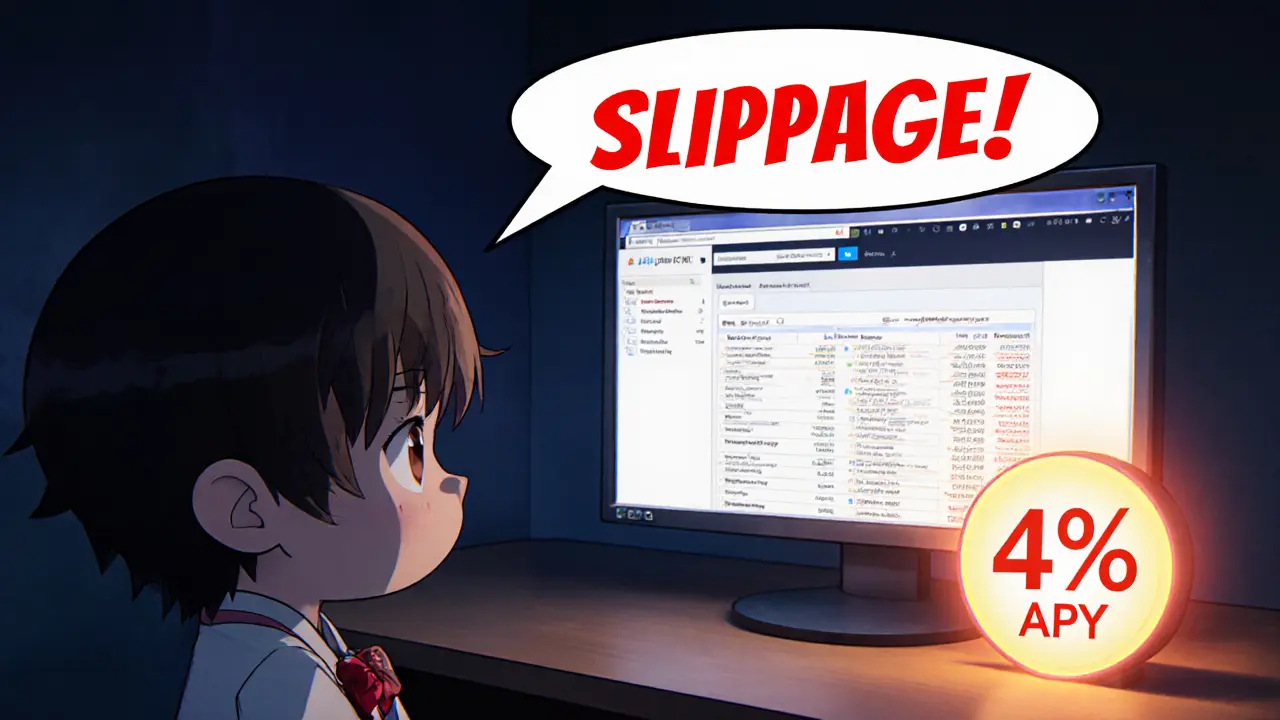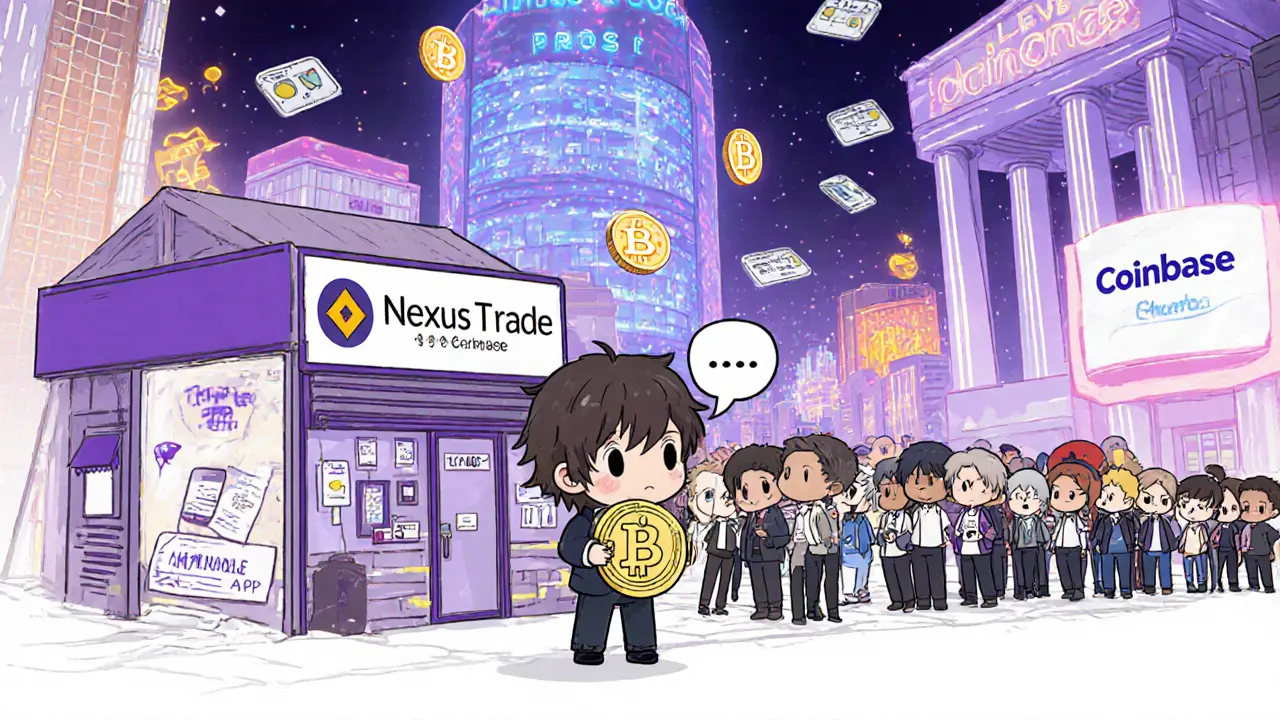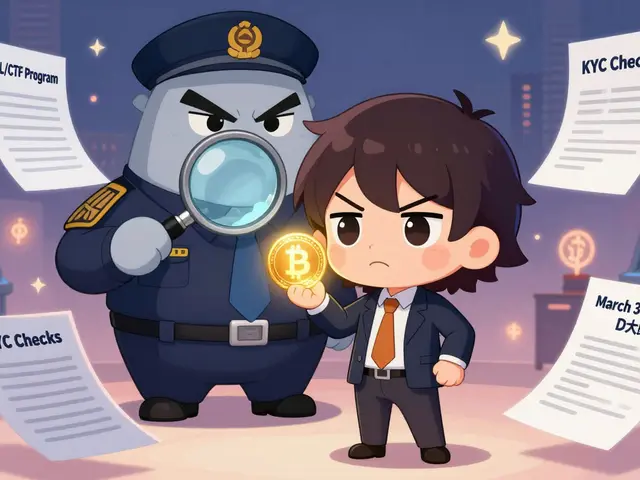Nexus Trade Fee Calculator
Calculate Your Trading Fees
See how Nexus Trade's flat 0.22% fee compares to major exchanges for different trade amounts.
Fee Comparison
Nexus Trade: 0.22% Flat FeeEnter a trade amount to see fee comparison
When you're just starting out in crypto, you don’t need a dozen trading tools, complex fee tiers, or a mobile app that crashes every time you check your balance. You need something simple, clear, and cheap. That’s the promise of Nexus Trade, a crypto exchange that launched in 2024 with no fanfare and no leadership team to speak of. It doesn’t advertise on TV. It doesn’t sponsor sports teams. It doesn’t even have a mobile app. But it does charge a flat 0.22% fee on every trade - no matter if you’re buying $20 of Bitcoin or selling $5,000 of Ethereum. And for some people, that’s enough.
What Nexus Trade Actually Offers
Nexus Trade is a spot-only exchange. That means you can buy and sell crypto at current market prices. No leverage. No futures. No margin trading. No stop-loss orders. If you’re looking to short Bitcoin or set automated exits, you’ll need to go elsewhere. This isn’t a platform for day traders or algorithmic strategies. It’s built for people who want to buy crypto, hold it, and maybe earn a little interest while they wait. Its wallet system lets you deposit both crypto and fiat currencies - USD, EUR, GBP, and others - and automatically converts them at live rates. No extra conversion fees. That’s rare. Most exchanges make you deposit crypto first, then convert it manually. Nexus Trade skips that step. You link your bank account, deposit cash, and instantly start trading. For beginners, that’s a relief. The interface is clean. No cluttered dashboards. No confusing tabs. You see your balance, a simple buy/sell panel, and a list of 63 trading pairs. That’s it. Bitcoin, Ethereum, Solana, Cardano, and a few dozen stablecoins. Not 1,000 like Binance. Not even 200. But you don’t need 1,000 if you’re just starting out.The Nexus Vault: Low Returns, But Low Risk
Nexus Trade’s biggest selling point after low fees is its passive earnings program: Nexus Vault. You lock up your crypto - mostly stablecoins like USDT or USDC - and earn between 2.5% and 4.5% APY. That’s not high. Nexo offered 12% before it collapsed. Celsius paid 8% before it vanished. But Nexus Vault doesn’t lend your assets out to third parties. There’s no public proof, but users report that funds stay within the exchange’s internal reserves. No DeFi protocols. No lending pools. Just a simple interest account. For people who’ve lost money to collapsed yield platforms, that’s reassuring. It’s not the highest return you can get, but it’s one of the few where you don’t have to ask, “Is this too good to be true?”Where Nexus Trade Falls Short
Here’s the problem: simplicity has limits. First, there’s no mobile app. Not even a basic one. You can only trade through a browser. That’s fine if you’re checking your portfolio once a week. But if you’re monitoring prices during market swings - and you should be - you’re stuck at your desk. Compare that to Binance, Coinbase, or Kraken: all have polished apps with push alerts, one-tap trades, and even voice commands. Nexus Trade doesn’t even try. Second, customer support is a ticket-only system. No live chat. No phone number. No Discord server. Users report waiting 3 to 4 days for answers to simple withdrawal questions. One Reddit user submitted a ticket on March 5 and didn’t hear back until March 28. That’s not acceptable when real money is on the line. Third, liquidity is thin. On major pairs like BTC/USD, order book depth is often under $50,000. That means if you try to buy $5,000 worth of Bitcoin, your order might get filled at a price 1.5% higher than you expected. That’s slippage. For active traders, that kills profits. On Binance, the same trade would have $2 million in depth - you’d barely move the market. Security is another concern. Nexus Trade uses SSL and two-factor authentication - standard stuff. But there’s no public proof of reserves. No third-party audit. No cold storage percentage disclosed. Kraken stores 95% of assets offline. Coinbase publishes monthly attestations. Nexus Trade says nothing. That’s a red flag. In crypto, silence on security isn’t neutrality - it’s risk.
Who Is This For?
Nexus Trade isn’t for everyone. It’s not for traders who need leverage, advanced charts, or mobile access. It’s not for people who want to trade dozens of obscure altcoins. It’s not for those who expect fast support or industry-leading security. But it is for someone who:- Wants to buy crypto without getting overwhelmed by features
- Prefer a flat 0.22% fee over Binance’s tiered system
- Has $20 to start (minimum deposit is low)
- Doesn’t mind waiting a few days for customer support
- Values simplicity over sophistication
How It Compares to the Big Players
| Feature | Nexus Trade | Binance | Coinbase | Kraken |
|---|---|---|---|---|
| Trading Fees | 0.22% flat (maker & taker) | 0.1% base, drops with volume | 0.6% standard | 0.16% base, volume discounts |
| Minimum Deposit | $20 | $2 | No minimum | $10 |
| Mobile App | No | Yes | Yes | Yes |
| Leverage Trading | No | Up to 125x | No | Up to 5x |
| Stop-Loss Orders | No | Yes | Yes | Yes |
| Passive Earnings | 2.5%-4.5% APY (Nexus Vault) | Up to 5% (Binance Earn) | Up to 4% (Coinbase Earn) | Up to 4.5% (Kraken Earn) |
| Security Audits | No public proof | Yes (regular) | Yes (monthly attestations) | Yes (third-party) |
| 24-Hour Volume | $14.3M | $28.7B | $3.1B | $1.8B |
| Customer Support | Ticket only, 3-4 day avg. | Live chat, email, phone | Live chat, email, phone | Live chat, email |

The Verdict: A Niche Tool, Not a Mainstay
Nexus Trade isn’t trying to beat Binance. It’s not trying to be the next Coinbase. It’s carving out a tiny space for people who want the bare minimum: low fees, simple interface, and fiat on-ramps. And for that, it works. But if you’re serious about crypto - if you plan to trade often, use advanced tools, or hold large amounts - this isn’t the place. The lack of mobile access, thin liquidity, and opaque security practices make it a risky long-term home for your assets. The $20 minimum and flat fee are nice, but they’re not enough to outweigh the missing pieces. Think of Nexus Trade like a basic bicycle. It gets you from point A to point B. It doesn’t have gears, suspension, or lights. You won’t race on it. But if you just need to go to the store and you don’t own a car? It’s fine.Frequently Asked Questions
Is Nexus Trade safe to use?
Nexus Trade uses standard security measures like SSL and two-factor authentication, which are necessary basics. But it doesn’t publish proof of reserves, cold storage percentages, or third-party audit reports - something every major exchange does. That lack of transparency makes it riskier than regulated platforms like Kraken or Coinbase. If you’re depositing more than you can afford to lose, consider using a more transparent exchange.
Can I trade altcoins on Nexus Trade?
Yes, but only 63 trading pairs are available as of mid-2025. You’ll find Bitcoin, Ethereum, Solana, Cardano, and major stablecoins. But you won’t find newer or obscure tokens like Pepe, Dogwifhat, or lesser-known DeFi coins. If you’re into niche altcoins, you’ll need a bigger exchange like KuCoin or Bybit.
Does Nexus Trade have a mobile app?
No. Nexus Trade is web-only. You must use a browser on your phone or computer. There’s no iOS or Android app, and no plans for one have been announced. This is one of its biggest drawbacks compared to nearly every other exchange in 2025.
How long does withdrawal take on Nexus Trade?
Crypto withdrawals usually process within 1-4 hours. Fiat withdrawals via bank transfer take 1-3 business days. The main delay comes from customer support - if your withdrawal triggers a review (which happens often), you may wait 2-4 days for a response. There’s no live chat to speed things up.
Is Nexus Trade regulated?
There’s no public evidence that Nexus Trade holds licenses in the U.S., EU, UK, or any major jurisdiction. It operates without clear regulatory oversight. That means you have no legal recourse if something goes wrong. Regulated exchanges like Coinbase or Kraken are subject to government audits and consumer protections - Nexus Trade is not.
What’s the best use case for Nexus Trade?
The best use case is for beginners who want to buy their first Bitcoin or Ethereum with a low minimum deposit and no confusing fee structure. It’s also useful if you live in a region with limited banking options and need to deposit fiat directly. But don’t use it as your main exchange if you plan to trade actively, use advanced tools, or hold large amounts long-term.




Derajanique Mckinney
October 28, 2025 AT 23:17Herbert Ruiz
October 29, 2025 AT 15:59Pranav Shimpi
October 31, 2025 AT 12:22Sheetal Tolambe
November 2, 2025 AT 10:46gurmukh bhambra
November 3, 2025 AT 19:22Dr. Monica Ellis-Blied
November 5, 2025 AT 18:13Kirsten McCallum
November 7, 2025 AT 09:26Paul Lyman
November 8, 2025 AT 11:04james mason
November 8, 2025 AT 22:29Will Barnwell
November 9, 2025 AT 16:37jummy santh
November 10, 2025 AT 23:11Saurav Deshpande
November 11, 2025 AT 13:09Anna Mitchell
November 11, 2025 AT 13:29Henry Gómez Lascarro
November 13, 2025 AT 05:42Rosanna Gulisano
November 13, 2025 AT 09:42Lawrence rajini
November 13, 2025 AT 12:00Frech Patz
November 15, 2025 AT 08:20Sunny Kashyap
November 16, 2025 AT 03:41